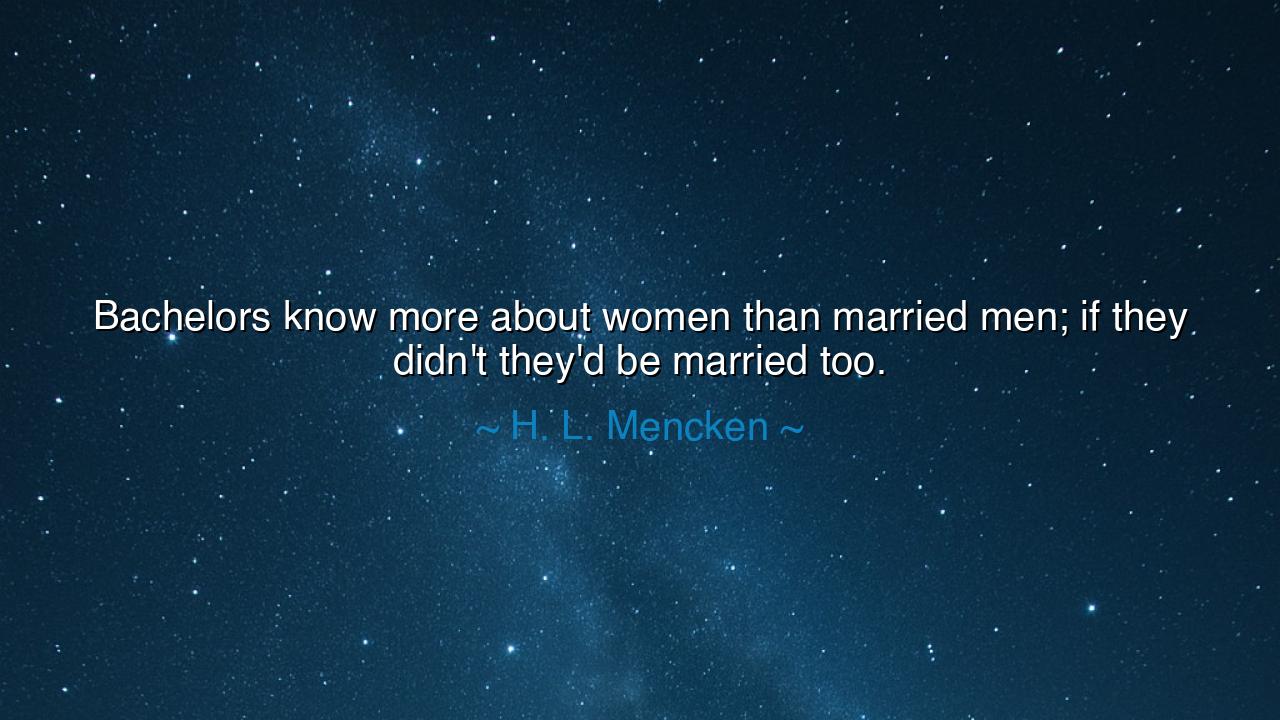
Bachelors know more about women than married men; if they didn't
Bachelors know more about women than married men; if they didn't they'd be married too.






The sharp-tongued critic and essayist H. L. Mencken, known for his wit and his fearless mockery of social conventions, once declared: “Bachelors know more about women than married men; if they didn’t they’d be married too.” With this remark, he cloaked wisdom in humor, as was his way. Beneath the laughter lies a deeper reflection on the nature of marriage, courtship, and the illusions of love. Mencken suggests that the unmarried man, by observing women without the haze of passion or the bonds of domestic duty, retains a kind of cynical clarity. The married man, by contrast, is softened or blinded by devotion, compromise, and perhaps resignation.
To say that bachelors know more is not to claim they possess true wisdom of women’s souls; rather, Mencken implies they have cultivated a cautious distance. They see not only beauty but also complexity, not only charm but also contradiction. The bachelor, recognizing these truths, hesitates before binding himself to wedlock. The married man, however, perhaps blinded by love or lulled by hope, commits—and in so doing, sacrifices his detached knowledge for lived experience. Thus, in Mencken’s irony, the price of marriage is the loss of this supposed knowledge, replaced by something deeper, but also more perilous.
History offers vivid examples. Consider Lord Byron, the great Romantic poet, who delighted in women yet shunned the permanence of domestic life. Byron observed with a cynical eye, praising beauty while lamenting its fleeting nature, celebrating passion while scorning fidelity. He was a bachelor most of his life, and though his knowledge of women was not always noble, it was sharp, detached, and free from the compromises of matrimony. Contrast this with men like Leo Tolstoy, whose marriage to Sophia was filled with both devotion and torment. In marriage, Tolstoy discovered truths far harsher than those Byron guessed: the pain of jealousy, the weight of children, the endless labor of compromise. Byron’s distance gave him freedom, but Tolstoy’s union gave him wisdom of another kind—the kind born not of observation, but of endurance.
Mencken’s wit also carries a sting of satire against male vanity. For to claim that bachelors know more is to suggest that marriage is a kind of folly, a leap taken by those too naive—or too hopeful—to avoid it. Yet this irony also exposes the truth that no man, bachelor or married, ever truly masters the mystery of women. The bachelor, standing outside, imagines himself knowing; the husband, within the marriage, discovers how little he truly knew. Mencken, with characteristic mischief, preferred to celebrate the outsider, the skeptic, the one who keeps his freedom, even if at the price of intimacy.
The deeper meaning, however, lies not only in mockery but in reflection on the illusions of knowledge. It is easy to claim wisdom from a distance, but true understanding comes only through lived experience. The bachelor may laugh at the husband’s burdens, but he also lacks the joys of companionship, the tenderness of shared struggles, the wisdom gained in walking beside another soul. Mencken teases us, but behind the jest is a question: what do we value more, the freedom of knowing or the transformation of loving?
The lesson for us is clear. Do not mistake cynical observation for true wisdom. To know of love from the outside is easy; to know it from the inside is harder, costlier, but richer. Mencken’s words warn us against blind idealism, reminding us that marriage is no dream but a reality filled with labor and sacrifice. Yet they also challenge us to see that the greatest knowledge is not in avoiding love’s risks, but in embracing them with open eyes.
Practical wisdom flows from this: if you remain a bachelor, do not pride yourself too much on what you think you know, for distance deceives. If you are married, do not despair at the trials, for in them lies the deeper wisdom of the human heart. Above all, let Mencken’s jest remind you that marriage is not for the blind dreamer, nor for the cold skeptic, but for the one who dares to balance both—who sees the truth, yet chooses love anyway.
Thus let the words of H. L. Mencken endure, both as humor and as counsel. For though the bachelor may boast of knowledge, and the husband may suffer for love, it is in the paradox of both that the full mystery of man and woman, of freedom and union, is revealed.






AAdministratorAdministrator
Welcome, honored guests. Please leave a comment, we will respond soon